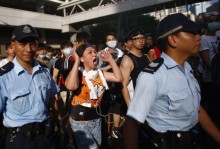Tens of thousands of Hongkongers are demanding for the fifth day running that China weakens its influence over Hong Kong. Their main requirement is for the central government to ensure that a sovereign democracy is functioning in the city and give people the right to elect the chief executive of Hong Kong in the election slated for 2017.
Western media have named the events in the former British colony the “umbrella revolution” because the protesters have been using these accessories to protect themselves from the police’s tear gas. The rallies did not abate even on October 1, the 65th anniversary of the founding of the PRC. They brought together different segments of the population: young, middle-aged and elderly, rich and poor. It is reported that about 30 Hongkongers have been injured in clashes with the police.
Western leaders have expressed concern over the escalation of protests in Hong Kong. Prime Minister of the UK David Cameron said that his nation’s agreement with China also referred to the importance of “giving the Hong Kong people a democratic future within this two systems approach.” It is too early to speak about any concessions on the part of the PRC government at the moment. The Chinese government has been calling the protests “illegal” and supporting the administration of Hong Kong so far. According to the former chief secretary of Hong Kong Anson Chan, China is not ready to let Hong Kong be democratically governed, as they fear that they would not be able to control it completely then.
Are the events in Hong Kong really a revolution and how the protests will affect the relationship of this special administrative region, which joined China in 1997, with the central government? We posed this question to head of the foreign policy department of the National Institute for Strategic Studies, sinologist Andrii HONCHARUK.
“We are dealing here with a totally different outlook, the Confucian one, which sees respect for one’s elders, authority and the state as fundamental principles. Comparing the events currently taking place in Hong Kong with the Euromaidan or other forms of democracy in the Christian world would be less than appropriate. There are other processes at work there. First, all residents of Hong Kong welcomed its reunion with the Middle Kingdom. They were not overjoyed to become dominated by the Communist Party of China, but they were really glad to see the colony return to the Greater China. Although Hong Kong was a relatively free part of the capitalist world, it was still a colony.
“It was over 15 years ago. A completely new generation has grown over this period that has no memory of the British rule. The young generation of the Hongkongers is a globalized one, immersed in the Internet. They feel closer to today’s reality and want to have the same degree of freedom as their peers in Paris, London or elsewhere. However, all these rallies should not be perceived as events of a revolutionary character. This is a bifurcation point, a manifestation of a gap between people’s actual situation and their desires, but nothing more. I am far from thinking that Hong Kong will see something similar to Thailand with its months-long clashes between protesters and government forces. It is about changing the paradigm of the relationship, not staging a revolution.
“As for ways to resolve the conflict, I believe that a compromise will be found. It is worth remembering that students did not oppose the Communist Party of China in Tiananmen Square 25 years ago. That event was not a protest against the communist regime, but an attempt to promote a new direction for the party. It is very important to understand this fact. The Chinese remember very well their own saying: living in a time of change is the worst thing that can happen to one.”







